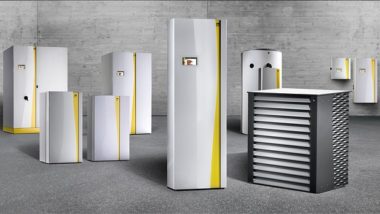Why install Ground Source Heat Pumps?
 Here are 3 reasons to install and run Ground Source Heat Pumps in your home.
Here are 3 reasons to install and run Ground Source Heat Pumps in your home.
The answer is that correctly designed and well installed, ground source heat pumps will lower fuel bills and reduce environmental impact, while providing reliable comfortable home heating. They can also provide both space and water heating, thus significantly lowering heating cost.
In fact there are many reports which indicate that in heating mode, heat pumps are three to four times more effective at heating than simple electrical resistance heaters using the same amount of electricity.
Reason 1 – Is to Save Money with Ground Source Heat Pumps
If it seems unbelievable to you that heat can be pumped, consider this. What you will actually be doing with a heat pump system is using a refrigerator in reverse! They transfer heat in this way because less high-grade energy is required than is released as heat.
Reason 2 – They Give You Air Conditioning in Hot Weather!
During the warm periods, heat pumps are able to reverse the process, and thus act like an air-conditioning unit (AC). We also find that this type of system often wins out when it comes to making a great investment that will provide the most effective solution to home comfort in all-seasons, over the long term.
Reason 3 – UK RHI Eligibility
In the UK heat pumps are eligible for the renewable heat incentive (RHI). With potential increases to the Renewable Heat Incentive (RHI) over the next few years, installers of ground source heat pumps system may well be able to get a pretty good return on investment. Check with your heat pump installation expert, at an early stage whether your installation will qualify for RHI payments.
If you are considering installing ground source heat pumps, make enquiries from an expert installer to see whether such a system will work for your project.
The savings you can make using air or ground source heat pumps will be affected by a number of factors including building construction, the heating fuel being replaced and the type of heat distribution system in use (radiators, warm air or underfloor for example).
One way to find a UK installer of heat pump systems is to visit our page for your county on this website, and contact an installer for more information and guidance.
More Reasons for Installing Heat Pumps
We looked around the internet and we found the following information on heat pumps and their advantages:
Heat pumps represent systems that ‘pump’ or move heat from one place to another by using a compressor and a circulating structure of liquid or gas refrigerant, through which heat is extracted from outside sources and pumped indoors.
Pumping the heat uses less electricity as compared to when electricity is solely used as a means to convert it. During the summers, the cycle for your ground source heat pumps, can be reversed and the unit acts like an air conditioner.
The heat pump system has been adopted at a slower pace in the UK, as opposed to other parts in Europe, due to the fact that the government recently started to implement a number of new schemes, which make the transition to green living smoother and more affordable. These practices have managed to catch the attention of the British population, and subsequently increasing the popularity of renewable energy technology.
Heat pumps represent the most efficient alternative to fuel, oil and electric systems in regards to both heating and cooling. Gas furnaces do a relative good job, rated close to 98 per cent efficient, however they do not represent a long term solution from a carbon footprint aspect. Heat pumps supply more heating and cooling capacity than the amount of electricity used to run them. Properly designed and installed heat pumps regularly attain more than 300 per cent efficiency. via GreenMatch
Advantages of an Electric Ground Source Heat Pumps System
Electric heat pumps provide an efficient system for heating and cooling your home. During colder seasons, it provides warmth not by convert electricity directly into heat, but rather by absorbing the heat from the atmosphere or ground, multiplying it and then transferring heat to the home.
During warmer weather, the pump functions as an air conditioner. It transfers heat from the house and creates a cooling effect throughout. This process saves on energy usage for air conditioning.
These systems are much cheaper to use than those fueled by natural gas and do not generate dry air when heating. This spares you from having to use a humidifier to combat the dry air as is the case with furnaces.
The pump also provides uniform heating for the home. You will not experience frequent temperature fluctuations, as associated with other systems. Electric pumps are also quiet and comfortable to use. The air compressor is usually placed outside the building and helps to keep noise levels low. Other heat pump types can produce a lot of noise when in use.
Electrically–fueled pumps also have “green“ benefits, as they do not pollute the environment. Other systems, such as furnaces, cause considerable pollution during combustion. The convenience, cleanliness, and efficiency of an electric heating pump add to the value of your home. via EHP
Don’t be Put-Off by Stories of Early Adopter “Install a Ground Source Heat Pumps System” Teething Problems
Heat pumps have suffered from bad publicity over the years. Early designs weren’t always the most reliable, and they were often very drafty, since heat pumps require more airflow than gas furnaces do. But simply put, heat pumps are just air conditioners that can also run backwards.
To understand the principle, feel the air that blows from the condensing unit of an air conditioner (the outside part). You’ll notice that it is about 20 degrees warmer that the outside ambient air temperature. Yet, even when the outdoor temperature is above 100 degrees, the air conditioner makes the indoor air cooler.
This cooling happens because a warm, high-pressure gas is sent to a coil and fan outdoors where the heat is released, and a cool, low-pressure gas is cycled through an indoor coil and fan, where indoor heat is absorbed.
As a result, the air passing through the indoor coil leaves it about 20 degrees cooler than the indoor ambient temperature.
What Happens in winter if I Install a Ground Source Heat Pumps System?
In the winter, though, a reversing valve inside the ground source heat pumps workings, sends the warm gas to the indoor coil and the cool gas to the outdoor coil, where (regardless of the outdoor temperature) some heat is absorbed from the air and transferred to inside the house.
However, the colder the outdoor temperature, the less efficiently the heat pumps works. In fact, the ground source heat pump works marginally best when the outdoor temperature is above freezing. They are much less prone to efficiency reduction in cold weather than air-source versions.
Does this mean that heat pumps shouldn’t be used where temperatures normally drop well below 32 degrees during the winter?
No. In fact, heat pumps may operate at about the same cost as gas furnaces even in northern climates, depending on the costs of natural gas and electricity. If you check the average daily winter temperature in most areas, you’ll find they seldom run below the mid-30s range. (Ask your local utilities; they’ll be able to give you an accurate record of average temperatures.)
True, during cold nights, some supplemental heating is usually necessary.
That can come from electric resistance heaters, or for much greater efficiency, from specially adapted gas furnaces that can help heat pumps through periods of extreme cold. via HGTV
Check out the Ground Source Heat Pumps installers on this website.


